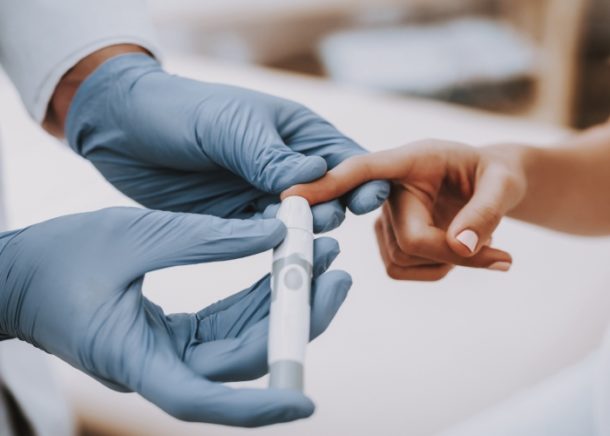The link between these two diseases has been studied for years and time and again a strong correlation has been found. The severity of periodontal diseases increases with poor glycemic control and blood sugar levels are more difficult to regulate in individuals with periodontal disease.
Periodontal disease has even been described as a complication of diabetes. So let’s look at each of these diseases, and why preventive care is so important.

Periodontal Diseases
As we discussed in a previous post, periodontal disease is the inflammation and destruction of gingival tissue and the bone supporting our teeth. It is fairly common, occurring in about 50% of American adults. Periodontal disease is the number one cause of tooth loss in adults.
Diabetes Mellitus
Diabetes is a chronic systemic illness affecting about 10% of American adults and another 35% are prediabetic. Many people think of diabetes as only affecting blood sugar levels, but the reality is it either directly or indirectly affects all of the organs in the body and their functions.
To maintain control of diabetes, regular testing of blood sugar is imperative.

The Link
The link between periodontal diseases and diabetes appears to go both ways. Severe periodontal disease accounts for about 10-15% of cases. Severe disease was found to be prevalent in around 60% of Diabetic patients as compared to 39% of non-diabetics.
It’s been shown the immune response is lowered in adults with diabetes making them more susceptible to general infections, including but not limited to periodontal diseases.
Diabetes also causes poor wound healing, which makes periodontal disease treatment less predictable. Poor collagen synthesis and impaired production of bone cause weakened gum tissue, ligaments, and bone supporting the teeth.
So we now know how uncontrolled diabetes increases the risk for periodontal diseases, now to look at the reverse. Severe periodontal disease increases blood sugar levels and increases the time an individual spends with higher blood sugar.
This effect on blood sugar also makes it more difficult to gain control and keep at a stable level. These two diseases play off of each other making each one worse.
In summary, the link here has been vastly studied and nearly always results in a negative impact of one disease on the other. Prevention is key and maintaining good oral hygiene can help keep a good grasp on glycemic control.
Also, working with your physician to keep your HbA1c below 7% is imperative to decreasing your risk of severe periodontal disease. Make sure to keep your dental professional aware of changes in your health so we help you in any way we can to take control of your oral & overall health!
References
American Academy of Periodontology
https://www.perio.org/consumer/gum-disease-and-diabetes.htm
J Pharm Bioallied Sci. 2012 Aug; 4(Suppl 2): S280–S282.Diabetes & Periodontal Disease
https://www.ncbi.nlm.nih.gov/pmc/articles/PMC3467897/
Diabetologia. 2012 Jan; 55(1): 21–31. Periodontitis and diabetes: a two-way relationship
https://www.ncbi.nlm.nih.gov/pmc/articles/PMC3228943/
CDC
https://www.cdc.gov/diabetes/data/statistics-report/index.html
